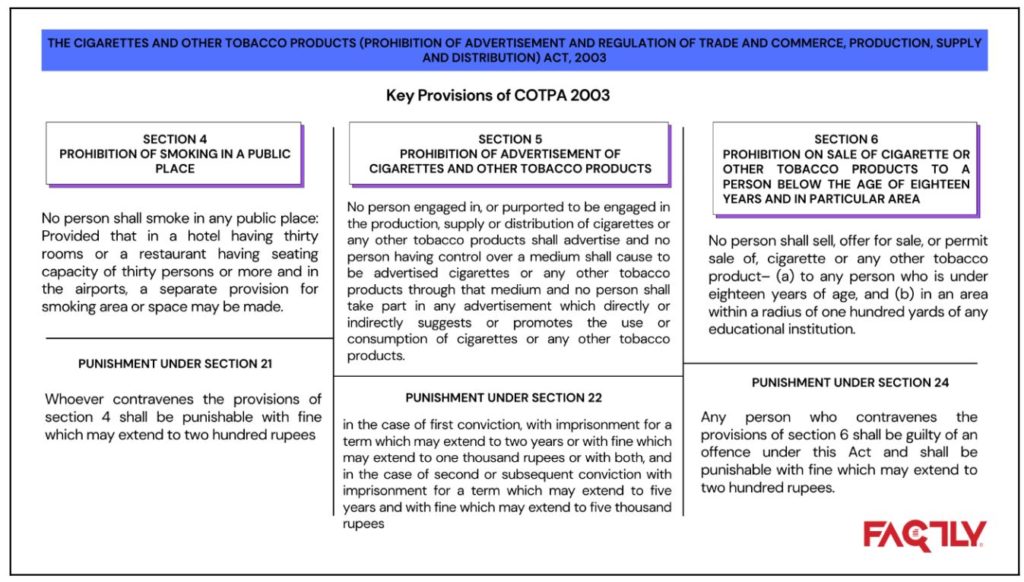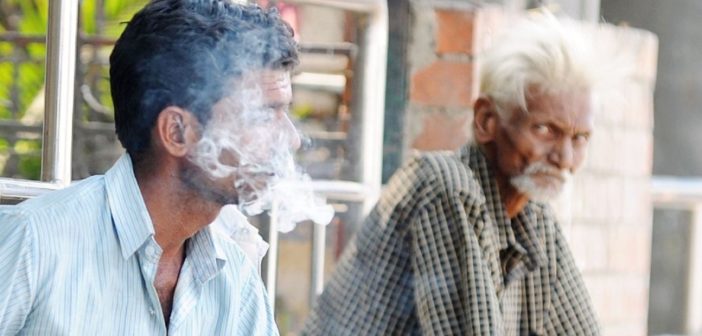COTPA 2003 is a comprehensive law on tobacco use enacted to prohibit the consumption of cigarettes and tobacco products and regulate its trade and advertising to improve the public health. As per data between 2019-20 & 2021-22, the four states of Karnataka, Kerala, Gujarat, and Punjab accounted for 75% of the persons fined under sections 4 & 6 of COTPA 2003.
The Government, in an answer to a question on tobacco sale and consumption, provided statistics about the number of people fined under Section 6 of the Cigarettes and Other Tobacco Products (Prohibition of Advertisement and Regulation of Trade and Commerce, Production, Supply and Distribution) Act, 2003 (COTPA, 2003). This data along with the data from the Crime in India report of the NCRB is vital in understanding the implementation of the COTPA 2003. In this story, we look at India’s response to the tobacco epidemic and some data points relating to its consumption and sale. You can read Factly reports on COTPA 2003 here, here and here.
Tobacco is one of the leading causes of non-communicable diseases
Tobacco usage, in any form, is one of the leading causes of non-communicable diseases in India, and the world. Tobacco deaths rarely make it to headlines. In fact, tobacco kills about half its own users. Tobacco contains an addictive drug called Nicotine and it is easily absorbed by the blood through lungs. Whether you smoke it, sniff it, or eat it, the result is the same. As per the World Health Organization, the tobacco epidemic is one of the leading public health hazards, killing more than 8 million people a year.
Tobacco is not only a health issue- but it is also both an environmental and economic issue. Most cigarette butts end up in landfills and contain materials that are hard to biodegrade. Tobacco use is expanding at a greater rate in low-income countries, where millions of individuals succumb to lethal addiction every year. Contrary to the industry’s assertions on job creation and income generation, the primary contributions of the tobacco industry to any nation seem to be disease, death, and economic losses. For the poor and impoverished, purchasing tobacco means abandoning funds for essentials like food, shelter, education, and healthcare. The net economic effect of tobacco usage is to exaggerate poverty.
Eighty percent increase in cases under COTPA in last five years
The Cigarettes and Other Tobacco Products (Prohibition of Advertisement and Regulation of Trade and Commerce, Production, Supply and Distribution) Act, 2003 (COTPA, 2003) is a comprehensive law on tobacco use enacted to prohibit the consumption of cigarettes and tobacco products and regulate its trade and advertising to improve the public health. Some of its key provisions relate to the restrictions on the sale and consumption of tobacco products, restrictions on advertising and marketing, regulations on the packaging of tobacco products and powers of the Government in upholding these provisions.
The National Crime Records Bureau’s (NCRB) ‘Crime in India’ report provides a state-wise number of cases registered under the COTPA 2003. Prior to 2017, this data was included in ‘other SLL crimes’, while from 2017, it is listed under ‘Environmental Offences’ in the ‘Crime in India’ report.
The data from 2017 to 2021 indicates a huge increase in the number of cases filed under the COTPA 2003. In 2017, the number of cases registered was 29579, which rose to 49639 in 2020, and to 53946 in 2021, amounting to an 80% increase over the last five years. To be precise, there was a steep 120% jump in cases from 2019 to 2020 itself. This could be majorly due to the prohibition on spitting in public places to restrict the spread of COVID-19.
Penalty provisions of the COTPA 2003
The COTPA 2003 provides for punishments for different violations of the act as mentioned below.

From the above, it is clear that all these key sections have a provision for levying penalties for violations. We shall look at the trends in the penalties levied under these sections.
Under Section 4 of the COTPA 2003
Section 4 prohibits smoking in public places. A public place is defined under Section 3(l) of the same statute as below.

The data for the last three years on the number of persons fined (challaned) under Section 4 of COTPA 2003, as received from States/UTs indicate that there is a 16% decline in the number of people fined in 2021-22 as compared to 2019-20. The number was 5,26,029 in 2019-20, which declined by 29% to 3,71,313 in 2020-21. Thereafter, the year 2021-22 saw an increase of 18% from 2020-21, to reach 4,39,124. This includes data from thirty-two states and UTs and excludes Bihar, Rajasthan, Delhi, Dadra and Nagar Haveli and Daman and Diu as these provided the data cumulatively for both Section 4 and Section 6 of the act.
Under Section 6 of the COTPA 2003
Section 6 of the COTPA 2003 prohibits the sale of cigarettes or other tobacco products to a person below the age of eighteen years and in an area within a radius of one hundred yards of any educational institution.
The data for the number of people fined for violations under section 6 of the COTPA 2003 indicate that there is a decline in the number of people fined during 2020-21 and 2021-22. During 2017-18, a total of 1,11,250 people were fined, which rose to 1,18,460 in 2018-19, and further to 1,45,981 during 2019-20. This decreased by almost half to 72,537 during 2020-21, and it further declined to 64,443 during 2021-22.
Huge inter-state variation in booking violations for the COTPA, 2003
In addition to the Central act, several states such as Karnataka, Telangana, Tamil Nadu, Delhi, Goa, Rajasthan have enacted state-specific laws, while other states have adopted the COTPA 2003 with minor state-specific amendments. Several states like Kerala, Madhya Pradesh, Telangana have enforced bans on all forms of chewing tobacco products, and manufacture, storage, distribution and sale of gutkha and pan masala.
While there is a good legislative intent behind the passage of such statutes, the implementation of these acts plays a crucial role in determining the success of such bans. The data on the number of people fined for violating COTPA 2003 is highly skewed towards four-five states such as Karnataka, Kerala, Gujarat, and Punjab. These states account for more than 75% percent of all the cases booked under the section 4 and section 6 of the act. Two scenarios arise from this- either these states are seeing high tobacco consumption, or these states are implementing the provisions of COTPA 2003 very strictly. Either way, a lot of work still needs to be done on mitigating the tobacco epidemic.



